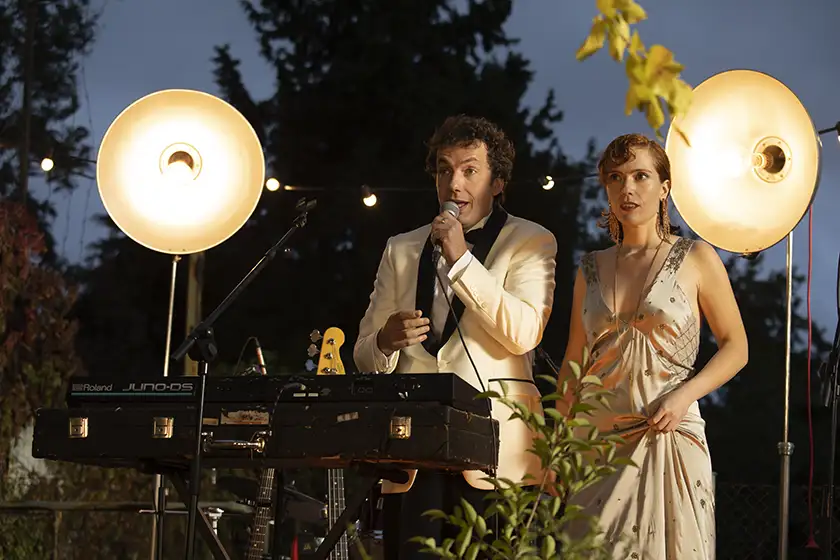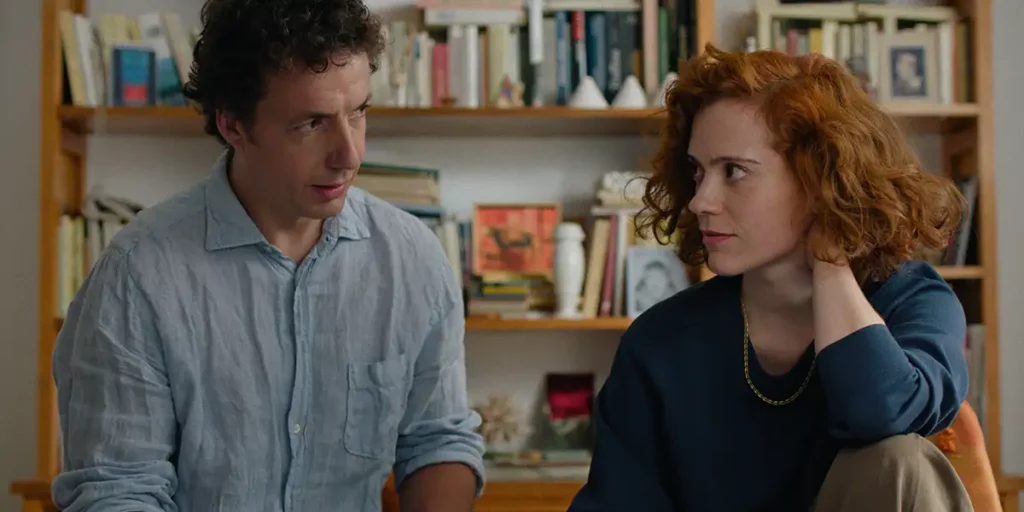The Other Way Around has a fascinating and unique premise, but its storytelling sometimes fails throughout the film.
Director: Jonás Trueba
Genre: Comedy, Drama
Run Time: 88′
Original title: Volveréis
Cannes Premiere: May 20, 2024
U.K. Release Date: July 11, 2025
U.S. Release Date: TBA
Where to Watch: In U.K. cinemas
“I always thought it would be a good idea for a film, […] but in real life, I don’t know” says one of the main characters at the beginning of The Other Way Around when talking about her situation. In its introduction, the film already nods to the audience while also acknowledging the interesting premise of the story that drew me to this movie in the first place. All of this makes sense thematically, especially once we watch the whole product, as the film does, in fact, cautiously thread the line between filmmaking and reality in an ambiguous way.
Set in Madrid, The Other Way Around (Volveréis) tells the story of a couple, or rather of their separation. After 15 years together, Ale (Itsaso Arana) and Alex (Vito Sanz) are separating, much to the shock of their friends and family who have always thought of them as the perfect couple. But, everything is okay between them. This is why they are throwing a party to mark the occasion of their amicable split, inspired by something Ale’s father used to say: it is better to celebrate a separation than a union as you never know how long a marriage is going to last. At the same time, they are both busy at their respective jobs with Ale trying to finish her film while going through the separation.
The Other Way Around is not the first film – and it presumably won’t be the last either – to focus heavily on filmmaking in its plot. As both main characters work in filmmaking, it is only natural this would feature prominently in the story. But is focusing on something the viewers most likely know and love enough to win them over? This film is a good example of why that does not always work: its commentary on the industry, and on filmmaking itself, is pointless at best, as there is no commentary on it. In the end, the characters might as well have worked in a bookshop or at the grocery store: it would not have made a difference at all.
As the film goes on, it becomes increasingly clear that The Other Way Around tries to push the boundary between film and reality, but does it really succeed? There are multiple scenes where the movie wants us to question whether we are watching the actual film or, rather, the one Ale has been working on. While this could have been an interesting idea, I don’t think this was the story the film was trying to tell, which makes it appear confused, and confusing, in its storytelling. The whole filmmaking plot is only secondary to the separation storyline and, logically, dedicated a lot less time, which makes this blurring the lines not work as much as it could have if the movie solely focused on that.

From a storytelling point of view, the film is disappointing too, with a lack of depth in its characters’ arcs and overall storylines. By the time the film ended, I found myself knowing very little about them or their relationship at all. If anything, I had even more questions about the main couple: how did they meet in the first place? Why are all their friends shocked to see them separating? The Other Way Around would have worked better with a little backstory, even if minimal, on the main characters to get the audience to care about this couple, and their separation, in the first place.
For a film that is not even two hours long, The Other Way Around also feels incredibly long and repetitive. One of the characters in the film says: “the problem, more than anything, is that it is repetitive” when talking about the movie Ale is making within the film and that is precisely the problem with The Other Way Around too. There are certain lines in the script that come back over and over, repeated in the exact same way and with the exact same format: while this may theoretically work to reinforce a specific concept, it becomes too predictable – and quite frankly boring – by the time the film ends.
Overall, there is very little that I actually liked about The Other Way Around other than its fascinating premise which is under-delivered by the end of the film. More than anything, I was disappointed to see such a messy film that could have been a lot better, given the promising ideas it started with. For example, I wish the movie had focused more on the separation party, which we don’t even really see in the end, rather than including all the seemingly pointless and irrelevant sequences on filmmaking.
The Other Way Around (Volveréis) premiered at the Cannes Film Festival on May 20, 2024 and will be released in U.K. cinemas by AX1 Films on July 11, 2025.

